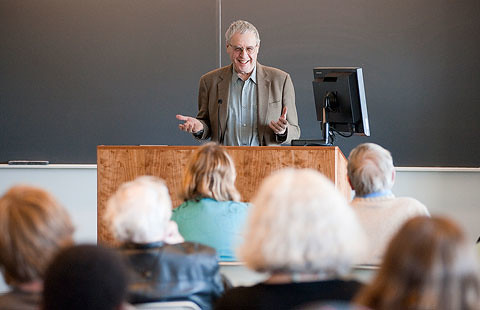 Charles Simic, 2007 poet laureate, delighted an intent audience with his dark humor on Tuesday night in the Robert Ho Lecture Room.
Charles Simic, 2007 poet laureate, delighted an intent audience with his dark humor on Tuesday night in the Robert Ho Lecture Room.
“The corpses like cigarette butts. In a dinner plate overflowing with ashes,” he read from the title poem of his latest book, That Little Something.
Having written more than 60 books, Simic has won numerous literary awards, including the 1990 Pulitzer Prize for Poetry for his collection of prose poems The World Doesn’t End.
In between reading his work, Simic told personal stories that offered a glimpse into each poem’s background. “At one point, I could beat every grown-up in my neighborhood at chess,” he revealed before reading a piece about the game that brought him some peace during wartime.
Simic was first exposed to war at the age of three when Nazis attacked Yugoslavia and bombed Belgrade, where he was born in 1938. “I’ve written so many poems about war because I’ve lived through so many — little did I know there would be more of the same in the new century,” he said.
 |
| Charles Simic, the 2007 poet laureate, speaks about his work at the Ho Lecture Room. (Photo by Andy Daddio) |
Explaining that English words had “been in his head” since childhood because he’d grown up watching Westerns, Simic developed his fluency when he emigrated from Yugoslavia to Chicago as a teenager. At that point, he hadn’t yet discovered his love of language through poetry — he wanted to be a painter.
Both the public lecture and a noontime discussion in which Simic discussed his book about artist Joseph Cornell were part of the ArtsMix forum, sponsored by the Institute for the Creative and Performing Arts.
Professor Peter Balakian introduced the poet laureate at the public lecture.
“The poems are inflected by apocalyptic images, burning cities, the nameless something lurking out there,” Balakian said. “Simic’s persona is a Houdini artist, finding ways to keep navigating the mad world.”
Despite the gravity of the topics Simic explores, he let it be known that he does not take himself too seriously. He spent much of his talk reading poems from his early work rather than his most recent book because, “When a new book comes out, you keep reading it over and over again and get really tired of the poems,” he joked. “Nobody loves themselves that much. At least, I don’t.”
Simics’s sense of humor also came through when he discussed the difficulty of writing love poems.
“What a hassle it is to find new ways to describe her hair and eyes and chin, because the whole point is you’re supposed to say she’s the most beautiful creature, but anything that comes to mind is really a cliché,” he said. His answer to that quandary was in his poem “My Beloved”: “Her eyes are flies in milk, her eyes are baby Draculas, to hell with her eyes.”